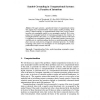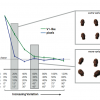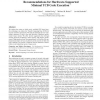3206 search results - page 4 / 642 » How minds can be computational systems |
ERCIMDL
2007
Springer
14 years 3 months ago
2007
Springer
Intelligibility, evolution and emulation are some of the key notions for digital information preservation. In this paper we define formally these notions on the basis of modules a...
WSPI
2008
13 years 10 months ago
2008
The paper presents a paradoxical feature of computational systems that suggests that computationalism cannot explain symbol grounding. If the mind is a digital computer, as computa...
BCSHCI
2007
13 years 10 months ago
2007
The defining characteristic of the Internet today is an abundance of information and choice. Recommender Systems (RS), designed to alleviate this problem, have so far not been ver...
CVPR
2009
IEEE
15 years 3 months ago
2009
IEEE
In recent years, large databases of natural images have
become increasingly popular in the evaluation of face and
object recognition algorithms. However, Pinto et al. previously
...
ASPLOS
2008
ACM
13 years 10 months ago
2008
ACM
We explore the extent to which newly available CPU-based security technology can reduce the Trusted Computing Base (TCB) for security-sensitive applications. We find that although...



